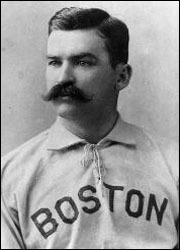
Wikimedia Commons
In honor of St. Patrick’s Day, I thought I’d take a moment to look at the life of Michael Joseph “King” Kelly: outfielder, catcher, baseball manager, and the son of Irish immigrants. Many even consider Kelly to be the game’s first true superstar.
Michael Joseph Kelly was born on December 31, 1857 in Troy, New York. He was the son of Mike and Catherine Kelly, who had left Ireland during the 1840s to escape the potato famine. In 1862, when little Mike was four years old, his father joined the Union army in the American Civil War, leaving Catherine to raise Mike and his older brother, James. Following the war, the family moved to the Washington, D.C. area. However, after his father fell ill, he left the army, and the Kelly family moved to Paterson, New Jersey. Sadly, the older Mike’s health continued to decline, and in the early 1870s, he passed away. His wife followed him in death shortly thereafter.
The now-orphaned Mike Kelly found work in a factory to support himself. At the end of each work day, he would spend his evenings playing baseball around town. Paterson was home to several amateur clubs, and in 1873, the fifteen-year-old Kelly was invited to play baseball on Blondie Purcell’s amateur team, which played teams throughout the New York metro area. From 1875 to 1877, he played three seasons of semi-pro ball in Paterson and in other cities.
In 1878, the Cincinnati Red Stockings offered Kelly a contract, making him a major league ballplayer at the age of twenty. The Red Stockings signed Kelly as a catcher and an outfielder, but he played primarily in the outfield since the Red Stockings already had an established catcher in Deacon White. After playing in Cincinnati for two years as an outfielder and backup catcher, Kelly took part as players from the Cincinnati team and the Chicago White Stockings went on a barnstorming tour of California. During the tour, Cap Anson invited Kelly to join the Chicago team for the 1880 season.
As a member of the White Stockings, King Kelly was among the league leaders in most offensive categories every year, including leading the league in runs from 1884 through 1886 and in batting in 1884 and 1886. He was also one of the best defensive catchers in baseball, becoming one of the first to use a glove, mask, and wear a chest protector. Cap Anson even gave credit to Kelly for inventing the hit-and-run, and he participated in devising strategies for the game that are now considered commonplace, including playing off first and third base, adjusting the outfield positions according to the player batting, the double steal, and the infield shift. Chicago won five pennants while Kelly played for the White Stockings.
Off the field, however, Kelly was known for his drinking, his charm, and his tendency to bend the rules. Kelly’s off-the-field behavior did not hurt his popularity with the fans, but he frequently was fined by team owners for disorderly conduct. Anson tried, but generally failed, to try to keep Kelly in line behaviorally, and to keep him physically fit.
After the 1886 season Chicago sold Kelly to the Boston Beaneaters for a then-record $10,000. By this time, the 28-year-old Kelly was arguably the biggest star in the National League. Newspapers and fans called him “King” Kelly or “The Only” Kelly. As a member of the Beaneaters, Kelly continued to produce offensively, scoring 120 runs in 1887 and 1889. He also continued to draw large crowds to games, even though Boston didn’t win any pennants. In addition, now that he was no longer under Cap Anson’s supervision, Kelly became even less self-disciplined, especially off the field.
During the 1890 season, Kelly managed and played for the Boston Reds in the Players’ League, and the Reds won the only Players’ League title under his leadership. Then, in 1891, Kelly returned to Cincinnati as the captain of a newly established American Association Reds. However, by August, the team folded, and Kelly signed back with the Boston Reds, who had moved to the American Association after the Players’ League folded. Kelly spent just four games with the Reds before returning to the Beaneaters to finish out the season.
After spending the 1892 season with the Beaneaters, batting a career-worst .189, his contract was assigned to the New York Giants for 1893. He played just twenty games for the Giants, batting .269 and driving in 15 runs.
Kelly’s big league career ended after the 1893 season, having collected 1,357 runs, 69 home runs, 950 RBIs, and a .308 batting average. He won eight pennants with various teams during his sixteen seasons, and he also hit better than .300 eight times. He led the league three times in both doubles and runs scored, and is one of the few NL players to have scored a record six runs in a game. In his career Kelly played every position on the diamond, even making appearances on the mound. Kelly was also known throughout the game for making controversial plays, including this play that led to the creation of Rule 3.03.
Off the field, King Kelly took on an acting career shortly after he first arrived in Boston. In March 1888, Kelly made his regular play debut, as Dusty Bob in Charley Hoyt’s “A Rag Baby.” He was also popular enough to book a vaudeville act during the 1892-1893 off season, where he was billed as “King Kelly, the Monarch of the Baseball Field.” In the off season of 1893-94, Kelly performed in “O’Dowd’s Neighbors.” Additionally, in 1889, he was the subject of the popular song, “Slide, Kelly, Slide.” Kelly’s autobiography, Play Ball was published while he was with the Beaneaters in 1888, the first autobiography by a baseball player.
King Kelly died of pneumonia in November 1894 in Boston. He was inducted into the Baseball Hall of Fame in 1945.

